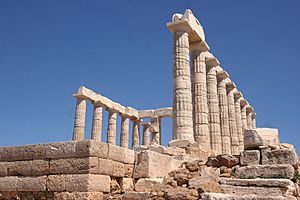Classical mythology facts for kids
Classical mythology is the study of ancient stories from Greece and Rome. These myths tell us about gods, heroes, and the world as people understood it long ago. They are a huge part of Western culture. The Greek word mythos means a spoken word or a story.
These ancient stories have inspired many things. You can find them in paintings, sculptures, and books. They also appear in music, opera, and ballet. Even today, classical myths are used in movies, TV shows, comic books, and video games. You might also see names from myths in astronomy (like planets named after gods) and biology.
For a long time, especially during the Middle Ages and Renaissance, people in Europe used Latin names for mythological figures. For example, the king of the gods was called Jove. Later, in the 1800s, Greek names became more popular. So, you might hear him called Zeus as well.
What is Classical Mythology?
Classical mythology usually refers to the myths from ancient Greece and Rome. These stories were first shared by people telling them aloud. Writers who collected and wrote down these myths are called mythographers. When we see a classical myth today, it often combines different versions from both Greek and Latin writings.
Greek Myths
Greek myths are stories from ancient Greek religion. They often focus on the actions of powerful gods and other amazing beings. These myths also feature heroes who did incredible things, going beyond what normal humans could do.
Roman Myths
Roman myths are traditional stories about the origins of Rome. They explain the city's religious customs and moral values. Roman myths usually focus more on human characters. Gods might appear sometimes, but there's always a strong feeling that destiny is guided by the gods.
Myths in Modern Culture
The myths you see in movies or games today might be a bit different from the original ancient stories. They are often changed to fit modern audiences. Still, they keep the spirit of the original tales alive.
See also
 In Spanish: Mitología clásica para niños
In Spanish: Mitología clásica para niños
 | Valerie Thomas |
 | Frederick McKinley Jones |
 | George Edward Alcorn Jr. |
 | Thomas Mensah |


